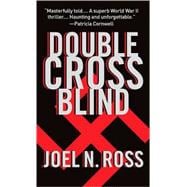
What is included with this book?
Joel Ross studied history at Hampshire College and taught English abroad for a short time before writing Double Cross Blind, his first novel. His father served in WWII, along with all five of his uncles, and their stories provided some of the background for the book. Currently, Ross lives in Maine with his wife, Lee.
The New copy of this book will include any supplemental materials advertised. Please check the title of the book to determine if it should include any access cards, study guides, lab manuals, CDs, etc.
The Used, Rental and eBook copies of this book are not guaranteed to include any supplemental materials. Typically, only the book itself is included. This is true even if the title states it includes any access cards, study guides, lab manuals, CDs, etc.
Excerpted from Double Cross Blind by Joel N. Ross
All rights reserved by the original copyright owners. Excerpts are provided for display purposes only and may not be reproduced, reprinted or distributed without the written permission of the publisher.